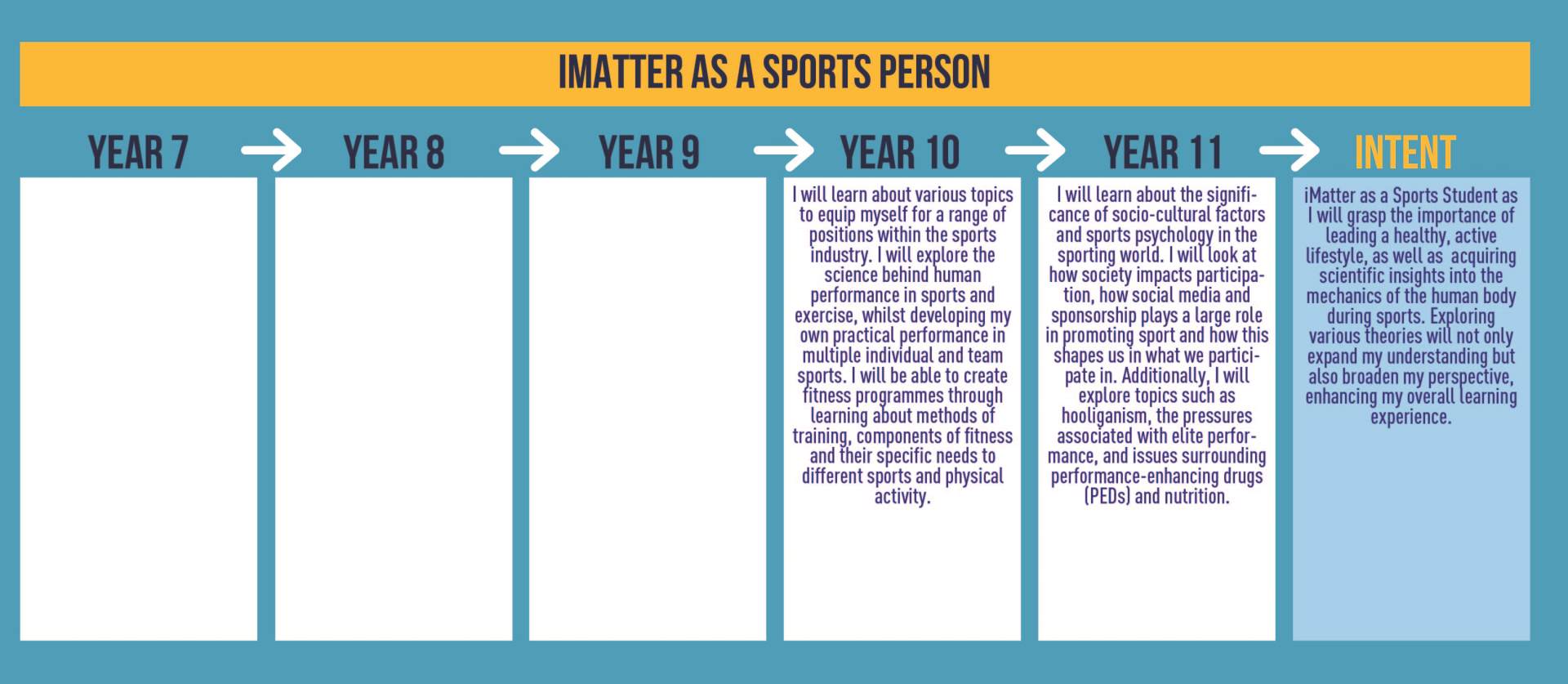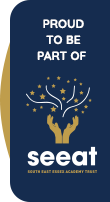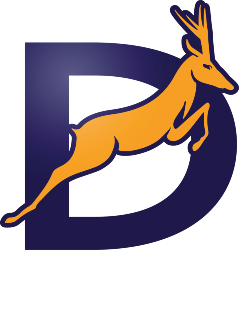sports science

Year 10 Curriculum plans
| Term | What are we learning? | What Knowledge, Understanding and Skills will we gain? | What will excellence look like? | How will these be assessed? |
|
Autumn |
R184 Contemporary Issues in Sport (Written Exam) - Topic Area 1
|
Students will investigate the issues which affect participation in sport including how user groups have possible barriers and suggesting solutions to these. Students will use the skills of analysing, evaluating, problem solving and listing all related to the issues studied. |
Students will take information that is given to them from the teacher and apply it to exam questions using their knowledge they have built up. Students will be able to identify, explain and compare to solve scenarios. | Students will sit mini tests set by the test. The final exam is assessed externally. |
|
Autumn |
R185 Performance and Leadership in Sports Activities –
Topic Area 2
|
Students will build the foundations of key components and ways to measure performance.
Students will use the skills of definition and listing components and training methods to prepare for practical performance.
|
Students will be given the tools to perform to high standards, this includes self and peer reflecting and implementing feedback to continuously improve. |
Students will complete a logbook which is checked and assessed by the teacher. An external moderator will select a small sample at the end of the year for quality assurance. |
|
Autumn |
R186 Sport and the Media (Coursework)
- Topic Area 1
|
Students will be able to distinguish between different media sources and how they cover sport. Students will then identify different forms of broadcast media and their role as traditional sources in comparison to newer broadcast and other media sources: TV, Radio, Podcasts.
Students will use the skills of evaluation, researching, comparison, production of relevant documentation to meet assignment brief. |
Students will be given a starting point to help them to research key information for when writing reports. Skills developing skim reading, picking out key details and re-wording to fit the need of assignment. |
Students will complete a set of assignments which is marked by the teacher. An external moderator will select a small sample at the end of the year for quality assurance. |
|
Autumn and Spring |
R184 Contemporary Issues in Sport (Written Exam)
- Topic Area 2 |
Students will explore the role of sport in promoting values of team spirit, fair play, citizenship, tolerance and respect as examples.
Students will use the skill of applying knowledge to exam style questions
|
Students will take information that is given to them from the teacher and apply it to exam questions using their knowledge they have built up. Students will be able to identify, explain and compare to solve scenarios. |
Students will sit mini tests set by the test. The final exam is assessed externally. |
|
Autumn and Spring |
R185 Performance and Leadership in Sports Activities – Topic Area 1 |
Students will be performing in preparation for assessment in two different activities demonstrating a good understanding of the key components.
The skills students will use and develop will be specific to the Sports undertaken which will be specific and unique to each student in the cohort. |
Students will be given the tools to perform to high standards, this includes self and peer reflecting and implementing feedback to continuously improve | Students will complete a logbook which is checked and assessed by the teacher. An external moderator will select a small sample at the end of the year for quality assurance. |
|
Autumn |
R186 Sport and the Media (Coursework) - Topic Area 2 |
Students will develop an understanding of the positive relationship between the media and sport. Students will understand how Sport initiatives seek promotion from the media and others areas including education. Students will focus on the importance of the golden triangle and the different opportunities for sponsorship of sport/performers and the industry.
Students will use the skills of researching, evaluating, comparison and writing a report.
|
Students will be given a starting point to help them to research key information for when writing reports. Skills developing skim reading, picking out key details and re-wording to fit the need of assignment. |
Students will complete a set of assignments which is marked by the teacher. An external moderator will select a small sample at the end of the year for quality assurance. |
|
Spring |
R186 Sport and the Media (Coursework) - Topic Area 3 |
Students will understand the negative effects of the media in sport including how the media is assisting a widening wealth divide in sport and impact of wider global issues. Students will study the increasing pressure on athletes to look a certain way and links to mental health.
Students will use the skills of researching, evaluating, comparison and writing a report.
|
Students will be given a starting point to help them to research key information for when writing reports. Skills developing skim reading, picking out key details and re-wording to fit the need of assignment. |
Students will complete a set of assignments which is marked by the teacher. An external moderator will select a small sample at the end of the year for quality assurance. |
|
Summer |
R184 Contemporary Issues in Sport (Written Exam)
- Topic Area 3 |
Students will understand the importance of hosting major sporting events and long term impact it can have on sport.
Students will use the skill of applying knowledge to exam style questions.
|
Students will take information that is given to them from the teacher and apply it to exam questions using their knowledge they have built up. Students will be able to identify, explain and compare to solve scenarios. |
Students will sit mini tests set by the test. The final exam is assessed externally. |
Year 11 Curriculum plans
| Term | What are we learning? | What Knowledge, Understanding and Skills will we gain? | What will excellence look like? | How will these be assessed? |
|
Autumn |
Paper 2 |
Students will learn about sports psychology and socio-cultural influences in Sport. Students will explore various PED’s that can impact sports performance as well as the need for health and fitness. Students will use the skills of analysis to evaluate factors of different social elements that impact sport engagement. Identifying the wider contexts of media, drugs and commercialisation influences. |
Students able to discuss topics and apply their knowledge, A01 should be answered instantly as the content is embedded whilst A02’s and AO3’ will be practised to help gain higher marks | Students will be assessed through teacher Q and A, module exams and contributions to discussions. Lots of exam papers will be completed. |
|
Autumn |
Handball
|
Students will develop their skills in game play in Handball to aid their GCSE practical grade. Practical lessons are about finding their best 3 sports. Tactical and technical awareness, performing skills in isolation and in a competitive environment. Skills students use will be specific to the AQA specification to ensure pupils are well prepared for their practical moderation day when they complete their GCSE. |
Students will be engaged in taking on roles and responsibilities within the lesson; scoring, referring or coaching for example. Students will also be performing the skills learned in KS3 in a more challenging environment. Effort and participation are fundamental. | Students will actively engage; effort and discussions will take place between peers and teachers to highlight understanding of the importance of an active healthy lifestyle. |
|
Autumn |
Badminton |
Students will develop their skills in game play in Badminton to aid their GCSE practical grade. Practical lessons are about finding their best 3 sports. Tactical and technical awareness, performing skills in isolation and in a competitive environment.
Skills students use will be specific to the AQA specification to ensure pupils are well prepared for their practical moderation day when they complete their GCSE.
|
Students will be engaged in taking on roles and responsibilities within the lesson; scoring, referring or coaching for example. Students will also be performing the skills learned in KS3 in a more challenging environment. Effort and participation are fundamenta | Students will actively engage; effort and discussions will take place between peers and teachers to highlight understanding of the importance of an active healthy lifestyle. |
|
Autumn |
Trampolining |
Students will develop their skills in game play in Trampolining to aid their GCSE practical grade. Practical lessons are about finding their best 3 sports. Tactical and technical awareness, performing skills in isolation and in a competitive environment
Skills students use will be specific to the AQA specification to ensure pupils are well prepared for their practical moderation day when they complete their GCSE.
|
Students will be engaged in taking on roles and responsibilities within the lesson; scoring, referring or coaching for example. Students will also be performing the skills learned in KS3 in a more challenging environment. Effort and participation are fundamental. | Students will actively engage; effort and discussions will take place between peers and teachers to highlight understanding of the importance of an active healthy lifestyle. |
|
Spring |
Football |
Students will develop their skills in game play in Football to aid their GCSE practical grade. Practical lessons are about finding their best 3 sports. Tactical and technical awareness, performing skills in isolation and in a competitive environment
Skills students use will be specific to the AQA specification to ensure pupils are well prepared for their practical moderation day when they complete their GCSE. |
Students will be engaged in taking on roles and responsibilities within the lesson; scoring, referring or coaching for example. Students will also be performing the skills learned in KS3 in a more challenging environment. Effort and participation are fundamental. | Students will actively engage; effort and discussions will take place between peers and teachers to highlight understanding of the importance of an active healthy lifestyle. |
|
Spring and Summer |
Revising Paper 1 and Paper 2 content in preparation for exam and finalising coursework. Practical lessons will increase in preparation for moderation. |
Paper 1 and Paper 2 content will be recapped, content will be chosen based on the class and individual weaknesses to ensure misconceptions and known mistakes are clarified to reduce it from happening in the exam. |
Students able to discuss topics and apply their knowledge, A01 should be answered instantly as the content is embedded whilst A02’s and 3’ will be practised to help gain higher marks. | Students will be assessed through teacher Q and A, module exams and contributions to discussions. Lots of exam papers will be completed. |
|
Spring |
Netball |
Students will develop their skills in game play in Netball to aid their GCSE practical grade. Practical lessons are about finding their best 3 sports. Tactical and technical awareness, performing skills in isolation and in a competitive environment
Skills students use will be specific to the AQA specification to ensure pupils are well prepared for their practical moderation day when they complete their GCSE.
|
Students will be engaged in taking on roles and responsibilities within the lesson; scoring, referring or coaching for example. Students will also be performing the skills learned in KS3 in a more challenging environment. Effort and participation are fundamental. | Students will actively engage; effort and discussions will take place between peers and teachers to highlight understanding of the importance of an active healthy lifestyle. |
|
Summer |
Practical moderation |
GCSE practical moderation will happen this half term, therefore preparation of various sports will be completed to aid students.
Skills students use will be specific to the AQA specification to ensure pupils are well prepared for their practical moderation day when they complete their GCSE. |
Students engage in taking on roles and responsibilities within the lesson; scoring, referring or coaching for example. Pupils will also be performing the skills learned in KS3 in a more challenging environment. Effort and participation are fundamental. | Students' practical work will have been assessed by teachers and an external moderator will visit the school to moderate the teachers marks. |





